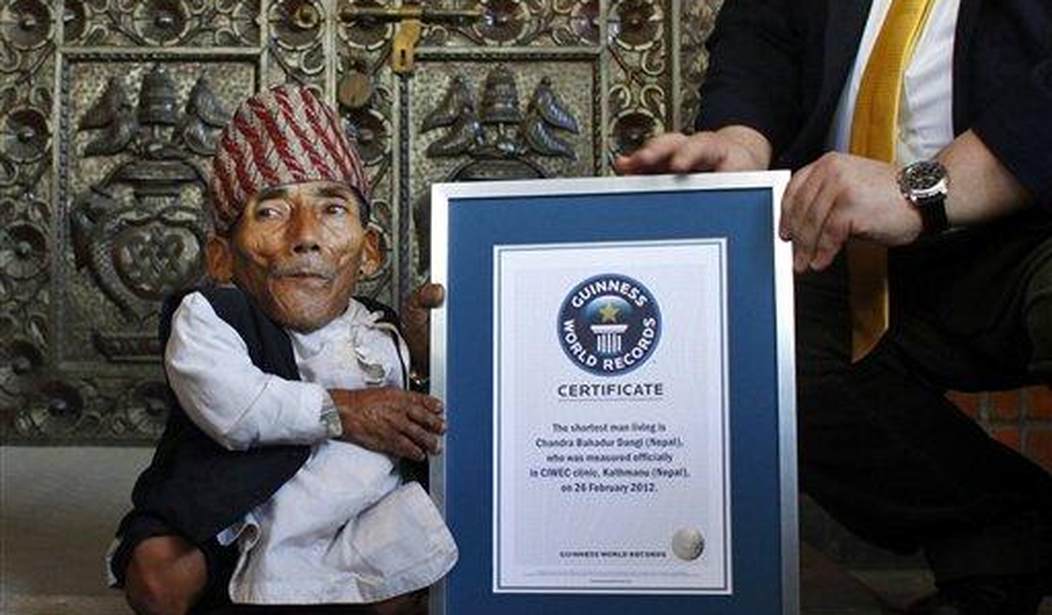I am short.
5’5″
Or, as I like to say, 5′ 5 1/2″ Gotta be exact, and get that extra few millimeters in there.
Imagine my glee when I discovered that the New York Times is promoting the idea that the shortening of the human race is good for the environment!
In Opinion
"From where I stand — at five feet even — being tall is a widely held fantasy of superiority that long ago should have been retired," writes Mara Altman in a guest essay. https://t.co/4lRcLTYrX5
— The New York Times (@nytimes) January 1, 2023
Now there is nothing surprising about the NYT wanting to reduce the total biomass of the human race. They have long wanted fewer people; it just never occurred to me that smaller people would also fit the bill.
Smaller as in shorter, though. As we all know pushing for people to be less…weighty…would be fatphobic. Or maybe that would be OK as long as we wanted shorter and thinner people, as long as they are white. Or is that racist?
I can’t keep track of what goes through these people’s minds. The rules keep changing.
In any case, the New York Times is concerned about the biomass of people, and as a result we should breed for shorter people. Whether those people are also obese or not is undetermined. Or something.
The short are also inherent conservationists, which is more crucial than ever in this world of eight billion. Thomas Samaras, who has been studying height for 40 years and is known in small circles as the Godfather of Shrink Think, a widely unknown philosophy that considers small superior, calculated that if we kept our proportions the same but were just 10 percent shorter in America alone, we would save 87 million tons of food per year (not to mention trillions of gallons of water, quadrillions of B.T.U.s of energy and millions of tons of trash).
I am tempted to think that this is a joke, because it is so absurd. But there is reason to believe it isn’t. Reduced stature helps promote a Greener planet, we are told:
Short people don’t just save resources, but as resources become scarcer because of the earth’s growing population and global warming, they may also be best suited for long-term survival (and not just because more of us will be able to jam into spaceships when we are forced off this planet we wrecked). Yuval Noah Harari, in his book “Sapiens,” wrote about a population of early humans who inhabited an island called Flores. Because of a rise in sea level, the island was cut off from other land masses.
“Big people, who need a lot of food, died first,” Mr. Harari wrote.
After generations, the people on the island evolved to reach only three and a half feet tall. They could do everything bigger humans could — make tools, hunt — but they could also stay alive when times got tough.
When you mate with shorter people, you’re potentially saving the planet by shrinking the needs of subsequent generations. Lowering the height minimum for prospective partners on your dating profile is a step toward a greener planet.
I initially though this take odd and even amusing, although upon reflection it fits with the modern-day Left’s hostility to human flourishing. Over the past century and a half, as human lifespans have shot up and general health and nutrition have improved, the height to which people are growing has shot up.
This has been the case throughout the world. The Dutch, for instance, are on average 7 1/2″ taller than their 19th century counterparts. They top the scales in the world for height increases, but the pattern exists everywhere: when people have access to good nutrition and health care, they attain great heights, so to speak.
You can even see the differences playing out in real time: North Koreans are several centimeters shorter than South Koreans despite sharing a genetic stock. So if reduced height is the goal, we have the means to get there: extreme poverty and poor health.
Of course genetics still plays a huge role. I am not short due to poor nutrition, I would guess. Not that I could tell you what I was fed as an infant. I know my mother smoked and probably drank some when I was gestating, so perhaps that had an effect. But overall I am short due to genes.
But the only surefire way we can ensure a shorter humanity other than eugenics is reducing overall health. And I am pretty sure that would be a tough sell. I will have to stay tuned to the NYT editorial page to find out.
Perhaps the World Economic Forum has a plan? And does it include eating bugs?








Join the conversation as a VIP Member